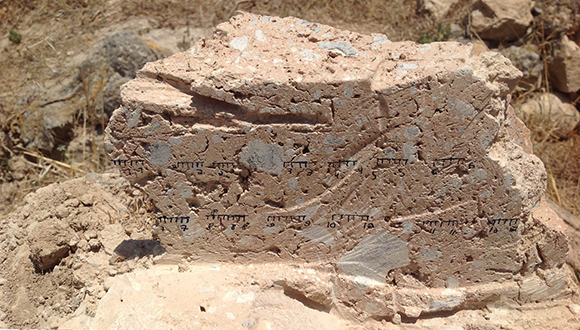On February 5, Tel Aviv University brought together key figures in the field of Artificial Intelligence (AI) for the highly anticipated AI Day 2024. This gathering served as a forum for researchers, industry professionals, and experts to delve into crucial issues in AI research and applications, providing insights into the foundational theories driving this rapidly evolving field. The event specifically highlighted AI’s significance in times of war, featuring discussions on computer vision, NLP, regulation, and the complexities of tackling fake news.
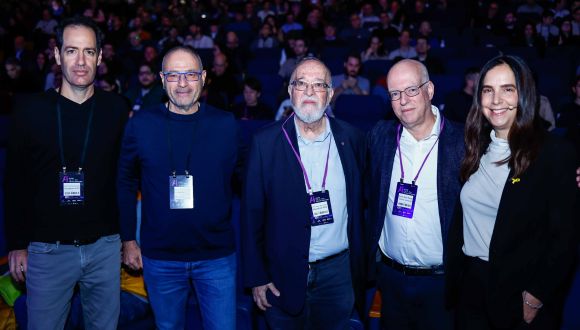 Yorai Fainmesser (Co-Founder, General Partner at Disruptive AI VC), Professor Meir Feder (Tel Aviv University), Major General Isaac Ben Israel (Director of TAU Blavatnik ICRC), Professor Ariel Porat (President of Tel Aviv University), Gili Drob-Heistein (Executive Director of the Blavatnik ICRC). Photo courtesy of Blavatnik ICRC
Yorai Fainmesser (Co-Founder, General Partner at Disruptive AI VC), Professor Meir Feder (Tel Aviv University), Major General Isaac Ben Israel (Director of TAU Blavatnik ICRC), Professor Ariel Porat (President of Tel Aviv University), Gili Drob-Heistein (Executive Director of the Blavatnik ICRC). Photo courtesy of Blavatnik ICRC
Opening the AI Day 2024, Professor Ariel Porat, President of Tel Aviv University, emphasized that the AI Day embodies the resilient spirit of Tel Aviv University and the country – as Israel does not have the privilege to suspend all activities for a year, nor can the university stop training students and producing research.
While a full AI week will take place later in the year, alongside the Cyber Week scheduled for June, a one-day event is a testament to the strength of Israel as a nation in these trying times.
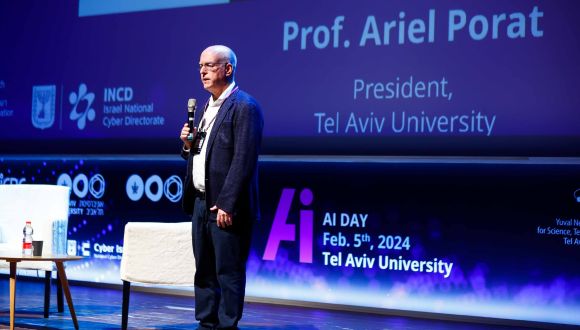 Professor Ariel Porat, President of Tel Aviv University (Photo courtesy of Blavatnik ICRC)
Professor Ariel Porat, President of Tel Aviv University (Photo courtesy of Blavatnik ICRC)
Prof Porat underscored TAU’s commitment to developing AI and data science expertise through its recently established multidisciplinary center that offers a cluster of AI and data science courses to TAU students from all faculties.
“Ideally all students should have the opportunity to study AI as it is an engine for the development of all research fields. And in each and every field there are different challenges to be overcome”—Professor Ariel Porat, President of Tel Aviv University
In 2023, Tel Aviv University enrolled its first cohort of graduate students in a newly launched master’s program in AI, further cementing TAU’s position as the largest AI center in Israel that fosters interdisciplinary collaborations in the field.
Perspectives on Challenges and Security Concerns
TAU Professor Meir Feder, head of the TAU Center for Artificial Intelligence & Data Science (TAD), offered his view of pressing issues in the field of AI. He addressed the exorbitant costs associated with AI, prompting questions about ownership rights and control.
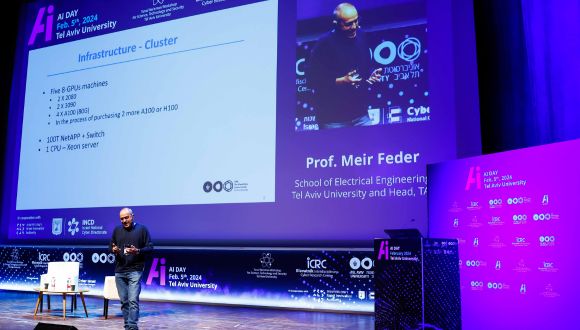 Professor Meir Feder, Tel Aviv University (Photo courtesy of Blavatnik ICRC)
Professor Meir Feder, Tel Aviv University (Photo courtesy of Blavatnik ICRC)
Prof. Feder remarked that, presently, AI falls short of true intelligence, characterizing it as a clever ‘cut and paste’ solution devoid of genuine creativity.
“We know what we built but we do not know why it works,”—Prof. Meir Feder
Major General (Ret.) Isaac Ben Israel, Chairman of the AI Day and the Director of TAU Blavatnik ICRC, highlighted several challenges associated with the rapid development of AI, emphasizing the escalating vulnerability of various spheres of human activity to cyber attacks. This vulnerability becomes ever more pronounced as our dependence on AI grows.
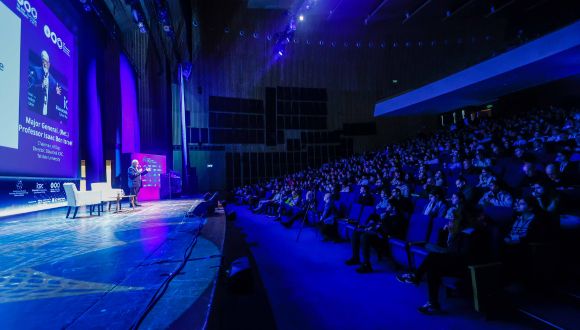 Major General Isaac Ben Israel, Director of TAU Blavatnik ICRC (Photo courtesy of Blavatnik ICRC)
Major General Isaac Ben Israel, Director of TAU Blavatnik ICRC (Photo courtesy of Blavatnik ICRC)
Given the critical significance of cybersecurity in light of the rapid proliferation of AI, a dedicated conference track was exclusively focused on security issues. The track centered on exploring the utilization of AI in intelligence gathering and analysis, threat detection, alert investigation, security posture analysis, and other pertinent areas to boost the effectiveness of security teams in their daily operations.
AI at the Service of Democracy and Truth
In the Fake News track, several of the talks focused on the AI tools that can efficiently detect fake images and stories online, identify social media bots and trolls used for commercial and political influence, and uncover deep fakes, which have inundated the social media recently in massive disinformation or influence campaigns.
“The Russia-Ukraine war was the first war fought on social media,”—Tom Alexandrovitch, Executive Director of the Defense Division, Israel National Cyber Directorate (INCD)
Zachary Elisha Bamberger, from the Technion, presented the AI-powered persuasive argumentation agent developed to combat hate and misinformation online in the wake of October 7.
The underlying principles of the agent that posts comments under anti-Israeli content on social media include establishing trust by citing sources and figures of authority, effectively using logic and complex reasoning, and leveraging emotional appeal.
 (Photo courtesy of Blavatnik ICRC)
(Photo courtesy of Blavatnik ICRC)
The solution can adjust the length and tone of the comments, as well as the level of formality and political and ideological stance to suit the target language and culture. It is also capable of understanding context and captions.
Using AI on social media provides for faster and more impactful responses across multiple platforms. The AI agent can also predict how popular the content will be and estimate confidence in the response. In addition, it can report hateful posts found online.
By 2026, 90% of media online will be AI-generated —Europol
Professor Irad Ben Gal, Head of TAU LAMBDA lab, discussed the strategy of unveiling inauthentic synchronized campaigns on social media. Emphasizing the importance of combating the infrastructure rather than individually pursuing posts, he highlighted the value of analyzing bot activity. This approach makes it possible to detect coordination of fake users, model their behavior, and make recommendations for exposing and mitigating their impact.
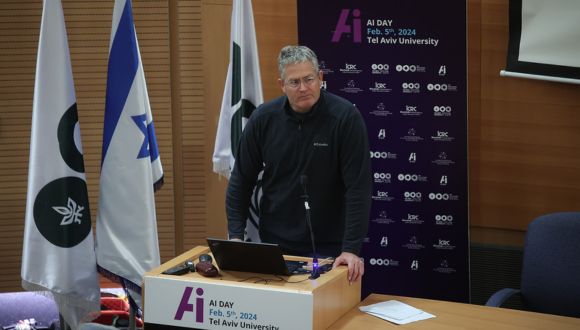 Prof. Ben Gal (Photo courtesy of Blavatnik ICRC)
Prof. Ben Gal (Photo courtesy of Blavatnik ICRC)
Prof. Ben Gal illustrated this approach with the example of the Gaza hospital attack, where an immediate surge in coordinated activity by a significant number of bots was observed.
$78 bln lost each year due to narrative attacks
+400% antisemitic incidents in the USA
88% of investors consider narrative attacks on corporations a serious issue
Michael Matias, CEO of Clarity, stressed that the staggering growth in the number of deepfakes online and AI disinformation in general poses the foremost threat to democracy on a global scale. Therefore, the critical task of detecting deepfakes is of paramount importance at the moment.
“There has been a 900% yearly increase in the number of deepfakes online,”—Michael Matias, CEO of Clarity
In the arms race of generative AI vs detector AI, another major task is protecting the integrity of history, so Clarity has been actively involved in the authentication of media from October 7 massacre.
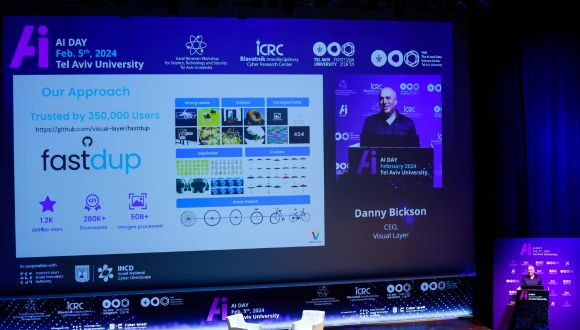 Danny Bickson, CEO of Visual Layer (Photo courtesy of Blavatnik ICRC)
Danny Bickson, CEO of Visual Layer (Photo courtesy of Blavatnik ICRC)
Computer vision experts have also been working with war footage, managing, exploring and visualizing war crime videos. Danny Bickson, CEO of Visual Layer, a startup creating & maintaining the popular open source fastdup for managing large-scale visual data, detailed the pro bono work the company has been doing for the Ministry of Diaspora and Ministry of Defense.
“The Iron Swords War is one of the first wars where critical visual information is found on millions of social network videos released daily.”— Danny Bickson, CEO of Visual Layer
Professor Karine Nahon, Head of Data, Government and Democracy program at Reichman University, emphasized in her talk about the work of the missing and hostages war room that technology alone is not sufficient. It is ultimately down to the people to not only develop new algorithms, but also to create an environment conducive to nurturing ideas.
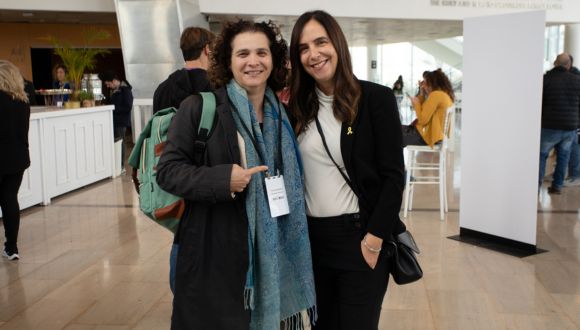 Professor Karine Nahon, Reichman University, and Gili Drob-Heistein, Executive Director of the Blavatnik ICRC and Yuval Ne’eman Workshop for Science, Technology and Security (Photo courtesy of Blavatnik ICRC)
Professor Karine Nahon, Reichman University, and Gili Drob-Heistein, Executive Director of the Blavatnik ICRC and Yuval Ne’eman Workshop for Science, Technology and Security (Photo courtesy of Blavatnik ICRC)
The volunteer initiative spearheaded by Nahon brought together 1500 people from academia and industry. They collaborated to pool data from diverse online sources, including Hamas’s telegram channels, content uploaded by individuals on the ground, and footage from Hamas terrorists. The goal of the team was to devise effective strategies for identifying hostages and kidnappers.
“You can’t use the usual face recognition AI when the face is bleeding. There is also a lot of human intelligence and social network analysis,”— Professor Karine Nahon, Reichman University
This concentrated effort has yielded at least six algorithms that can be helpful in the event of future multi-casualty incidents.
Becoming Stronger with AI
AI has the potential to enhance resilience across various sectors, spanning public services, education, health, defense, economics, emergency response, transportation, science, and climate.
In the field of education, AI can assist teachers in crafting personalized learning content tailored to individual student needs. However, it is imperative to consider crucial issues such as responsible AI usage, privacy protection, and ensuring equitable access to these technologies.
“Our goal is to understand how education can use AI in a smart and fair way, helping to create a strong and adaptable learning environment,”— Merav Mofaz, Microsoft Education
In the realm of medicine, AI plays a pivotal role, especially in diagnostics and DNA testing. It proves invaluable in forensic DNA analysis for identification purposes. Professor Noam Shomron, Head of the Functional Genomic Team at the TAU Faculty of Medicine, detailed the work undertaken post-October 7 to identify victims of the massacre using very small or damaged DNA fragments recovered from severely burnt bodies. Additionally, AI can aid in identifying soldiers potentially prone to PTSD, enabling preventive treatment.
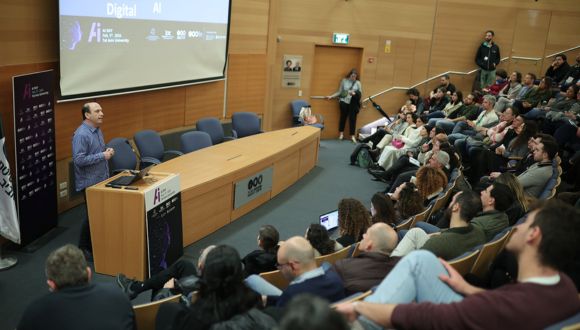 Professor Noam Shomron, TAU ( (Photo courtesy of Blavatnik ICRC)
Professor Noam Shomron, TAU ( (Photo courtesy of Blavatnik ICRC)
Professor Erez Shmueli, Head of the Big Data Lab and Co-Head of the Data Science undergraduate program at Tel Aviv University, presented findings from a study monitoring early signs of PTSD in individuals indirectly exposed to the October 7 events. The results reveal unprecedented levels of stress and PTSD among participants.
“News consumption and the number of gory videos watched significantly correlate with PTSD prevalence,”—Professor Erez Shmueli, Tel Aviv University
Continuous monitoring through smartwatches and daily questionnaires highlighted significant variations in stress, mood, step counts, sleep quality, and duration in the first week post-October 7 events, particularly among those who later developed PTSD.
What the Future Holds
In the fireside chat discussion, Professor Yoav Shoham, Co-founder and Co-CEO at AI21 Labs, shared insights on AI and natural language processing in 2024. He anticipates the continued emergence of new language models, with smaller specialized models potentially remaining open source, while larger models are likely to remain proprietary. Language models will be incorporated in larger, more comprehensive AI tools.
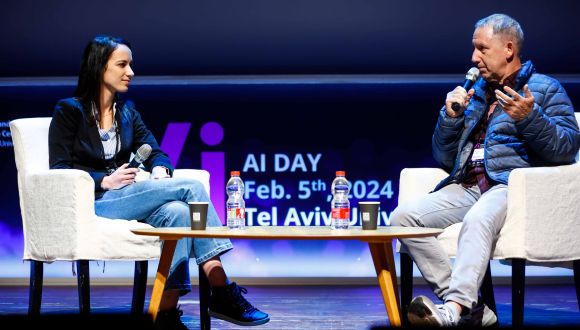 Mor Geva, Assistant Professor at the Blavatnik School of Computer Science, Tel Aviv University and Professor Yoav Shoham, Co-founder and Co-CEO at AI21 Labs (Photo courtesy of Blavatnik ICRC)
Mor Geva, Assistant Professor at the Blavatnik School of Computer Science, Tel Aviv University and Professor Yoav Shoham, Co-founder and Co-CEO at AI21 Labs (Photo courtesy of Blavatnik ICRC)
Shoham emphasized that the relationship with machines will be transformative for humanity rather than destructive. He envisions a future where machines and humans coexist and collaborate.
“We’ll control the potential downside. I’m more concerned that AI won’t be powerful enough than that it will be too powerful,”—Professor Yoav Shoham
Prof. Lior Wolf, in the Computer Vision track, noted that major AI tasks have been solved, leading to the next challenge of building and training general-purpose robots.
Dr. Ziv Katzir, head of the national AI program, highlighted global trends toward legal regulation of AI, including a proposed global treaty. Despite an overall decline in funding, there’s exponential growth in generative AI investment.
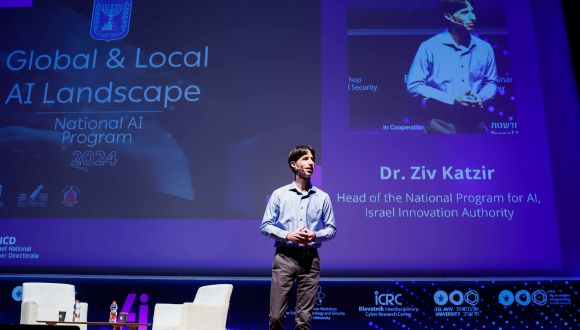 Dr. Ziv Katzir, head of the National AI program (Photo courtesy of Blavatnik ICRC)
Dr. Ziv Katzir, head of the National AI program (Photo courtesy of Blavatnik ICRC)
Locally, the National AI program shifted focus to practical solutions, emphasizing natural language processing for Hebrew and spoken Arabic, AI talent development through scholarships at all levels of higher education, investment in computer infrastructure, wider AI application in the public sector, and the development of a legal framework for trustworthy AI.
Israel consistently ranks in the top ten overall and is second in terms of per capita investment in AI
Since the outbreak of the Israel-Hamas war, the Israeli Investment Authority has launched a new fast-track fund to fund local high-tech companies in the product development phase to strengthen the sector and national economy as a whole.
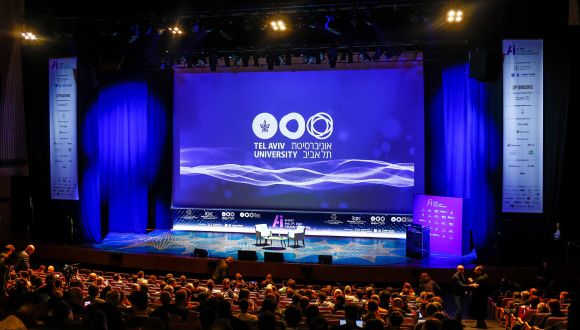 (Photo courtesy of Blavatnik ICRC)
(Photo courtesy of Blavatnik ICRC)
AI Day 2024, held at Tel Aviv University in cooperation with the Israel Innovation Authority and Israel National Cyber Directorate, captured the collaborative spirit of experts and industry leaders, emphasizing AI’s role in driving positive change. Beyond a gathering, AI Day 2024 embodied a commitment to a future where AI propels innovation and progress in tangible ways.
 Yorai Fainmesser (Co-Founder, General Partner at Disruptive AI VC), Professor Meir Feder (Tel Aviv University), Major General Isaac Ben Israel (Director of TAU Blavatnik ICRC), Professor Ariel Porat (President of Tel Aviv University), Gili Drob-Heistein (Executive Director of the Blavatnik ICRC). Photo courtesy of Blavatnik ICRC
Opening the AI Day 2024, Professor Ariel Porat, President of Tel Aviv University, emphasized that the AI Day embodies the resilient spirit of Tel Aviv University and the country – as Israel does not have the privilege to suspend all activities for a year, nor can the university stop training students and producing research.
While a full AI week will take place later in the year, alongside the Cyber Week scheduled for June, a one-day event is a testament to the strength of Israel as a nation in these trying times.
Yorai Fainmesser (Co-Founder, General Partner at Disruptive AI VC), Professor Meir Feder (Tel Aviv University), Major General Isaac Ben Israel (Director of TAU Blavatnik ICRC), Professor Ariel Porat (President of Tel Aviv University), Gili Drob-Heistein (Executive Director of the Blavatnik ICRC). Photo courtesy of Blavatnik ICRC
Opening the AI Day 2024, Professor Ariel Porat, President of Tel Aviv University, emphasized that the AI Day embodies the resilient spirit of Tel Aviv University and the country – as Israel does not have the privilege to suspend all activities for a year, nor can the university stop training students and producing research.
While a full AI week will take place later in the year, alongside the Cyber Week scheduled for June, a one-day event is a testament to the strength of Israel as a nation in these trying times.
 Professor Ariel Porat, President of Tel Aviv University (Photo courtesy of Blavatnik ICRC)
Prof Porat underscored TAU’s commitment to developing AI and data science expertise through its recently established multidisciplinary center that offers a cluster of AI and data science courses to TAU students from all faculties.
Professor Ariel Porat, President of Tel Aviv University (Photo courtesy of Blavatnik ICRC)
Prof Porat underscored TAU’s commitment to developing AI and data science expertise through its recently established multidisciplinary center that offers a cluster of AI and data science courses to TAU students from all faculties.
 Professor Meir Feder, Tel Aviv University (Photo courtesy of Blavatnik ICRC)
Prof. Feder remarked that, presently, AI falls short of true intelligence, characterizing it as a clever ‘cut and paste’ solution devoid of genuine creativity.
Professor Meir Feder, Tel Aviv University (Photo courtesy of Blavatnik ICRC)
Prof. Feder remarked that, presently, AI falls short of true intelligence, characterizing it as a clever ‘cut and paste’ solution devoid of genuine creativity.
 Major General Isaac Ben Israel, Director of TAU Blavatnik ICRC (Photo courtesy of Blavatnik ICRC)
Given the critical significance of cybersecurity in light of the rapid proliferation of AI, a dedicated conference track was exclusively focused on security issues. The track centered on exploring the utilization of AI in intelligence gathering and analysis, threat detection, alert investigation, security posture analysis, and other pertinent areas to boost the effectiveness of security teams in their daily operations.
Major General Isaac Ben Israel, Director of TAU Blavatnik ICRC (Photo courtesy of Blavatnik ICRC)
Given the critical significance of cybersecurity in light of the rapid proliferation of AI, a dedicated conference track was exclusively focused on security issues. The track centered on exploring the utilization of AI in intelligence gathering and analysis, threat detection, alert investigation, security posture analysis, and other pertinent areas to boost the effectiveness of security teams in their daily operations.
 (Photo courtesy of Blavatnik ICRC)
The solution can adjust the length and tone of the comments, as well as the level of formality and political and ideological stance to suit the target language and culture. It is also capable of understanding context and captions.
Using AI on social media provides for faster and more impactful responses across multiple platforms. The AI agent can also predict how popular the content will be and estimate confidence in the response. In addition, it can report hateful posts found online.
(Photo courtesy of Blavatnik ICRC)
The solution can adjust the length and tone of the comments, as well as the level of formality and political and ideological stance to suit the target language and culture. It is also capable of understanding context and captions.
Using AI on social media provides for faster and more impactful responses across multiple platforms. The AI agent can also predict how popular the content will be and estimate confidence in the response. In addition, it can report hateful posts found online.
 Prof. Ben Gal (Photo courtesy of Blavatnik ICRC)
Prof. Ben Gal illustrated this approach with the example of the Gaza hospital attack, where an immediate surge in coordinated activity by a significant number of bots was observed.
Prof. Ben Gal (Photo courtesy of Blavatnik ICRC)
Prof. Ben Gal illustrated this approach with the example of the Gaza hospital attack, where an immediate surge in coordinated activity by a significant number of bots was observed.
 Danny Bickson, CEO of Visual Layer (Photo courtesy of Blavatnik ICRC)
Computer vision experts have also been working with war footage, managing, exploring and visualizing war crime videos. Danny Bickson, CEO of Visual Layer, a startup creating & maintaining the popular open source fastdup for managing large-scale visual data, detailed the pro bono work the company has been doing for the Ministry of Diaspora and Ministry of Defense.
Danny Bickson, CEO of Visual Layer (Photo courtesy of Blavatnik ICRC)
Computer vision experts have also been working with war footage, managing, exploring and visualizing war crime videos. Danny Bickson, CEO of Visual Layer, a startup creating & maintaining the popular open source fastdup for managing large-scale visual data, detailed the pro bono work the company has been doing for the Ministry of Diaspora and Ministry of Defense.
 Professor Karine Nahon, Reichman University, and Gili Drob-Heistein, Executive Director of the Blavatnik ICRC and Yuval Ne’eman Workshop for Science, Technology and Security (Photo courtesy of Blavatnik ICRC)
The volunteer initiative spearheaded by Nahon brought together 1500 people from academia and industry. They collaborated to pool data from diverse online sources, including Hamas’s telegram channels, content uploaded by individuals on the ground, and footage from Hamas terrorists. The goal of the team was to devise effective strategies for identifying hostages and kidnappers.
Professor Karine Nahon, Reichman University, and Gili Drob-Heistein, Executive Director of the Blavatnik ICRC and Yuval Ne’eman Workshop for Science, Technology and Security (Photo courtesy of Blavatnik ICRC)
The volunteer initiative spearheaded by Nahon brought together 1500 people from academia and industry. They collaborated to pool data from diverse online sources, including Hamas’s telegram channels, content uploaded by individuals on the ground, and footage from Hamas terrorists. The goal of the team was to devise effective strategies for identifying hostages and kidnappers.
 Professor Noam Shomron, TAU ( (Photo courtesy of Blavatnik ICRC)
Professor Erez Shmueli, Head of the Big Data Lab and Co-Head of the Data Science undergraduate program at Tel Aviv University, presented findings from a study monitoring early signs of PTSD in individuals indirectly exposed to the October 7 events. The results reveal unprecedented levels of stress and PTSD among participants.
Professor Noam Shomron, TAU ( (Photo courtesy of Blavatnik ICRC)
Professor Erez Shmueli, Head of the Big Data Lab and Co-Head of the Data Science undergraduate program at Tel Aviv University, presented findings from a study monitoring early signs of PTSD in individuals indirectly exposed to the October 7 events. The results reveal unprecedented levels of stress and PTSD among participants.
 Mor Geva, Assistant Professor at the Blavatnik School of Computer Science, Tel Aviv University and Professor Yoav Shoham, Co-founder and Co-CEO at AI21 Labs (Photo courtesy of Blavatnik ICRC)
Shoham emphasized that the relationship with machines will be transformative for humanity rather than destructive. He envisions a future where machines and humans coexist and collaborate.
Mor Geva, Assistant Professor at the Blavatnik School of Computer Science, Tel Aviv University and Professor Yoav Shoham, Co-founder and Co-CEO at AI21 Labs (Photo courtesy of Blavatnik ICRC)
Shoham emphasized that the relationship with machines will be transformative for humanity rather than destructive. He envisions a future where machines and humans coexist and collaborate.
 Dr. Ziv Katzir, head of the National AI program (Photo courtesy of Blavatnik ICRC)
Locally, the National AI program shifted focus to practical solutions, emphasizing natural language processing for Hebrew and spoken Arabic, AI talent development through scholarships at all levels of higher education, investment in computer infrastructure, wider AI application in the public sector, and the development of a legal framework for trustworthy AI.
Dr. Ziv Katzir, head of the National AI program (Photo courtesy of Blavatnik ICRC)
Locally, the National AI program shifted focus to practical solutions, emphasizing natural language processing for Hebrew and spoken Arabic, AI talent development through scholarships at all levels of higher education, investment in computer infrastructure, wider AI application in the public sector, and the development of a legal framework for trustworthy AI.
 (Photo courtesy of Blavatnik ICRC)
AI Day 2024, held at Tel Aviv University in cooperation with the Israel Innovation Authority and Israel National Cyber Directorate, captured the collaborative spirit of experts and industry leaders, emphasizing AI’s role in driving positive change. Beyond a gathering, AI Day 2024 embodied a commitment to a future where AI propels innovation and progress in tangible ways.
(Photo courtesy of Blavatnik ICRC)
AI Day 2024, held at Tel Aviv University in cooperation with the Israel Innovation Authority and Israel National Cyber Directorate, captured the collaborative spirit of experts and industry leaders, emphasizing AI’s role in driving positive change. Beyond a gathering, AI Day 2024 embodied a commitment to a future where AI propels innovation and progress in tangible ways.

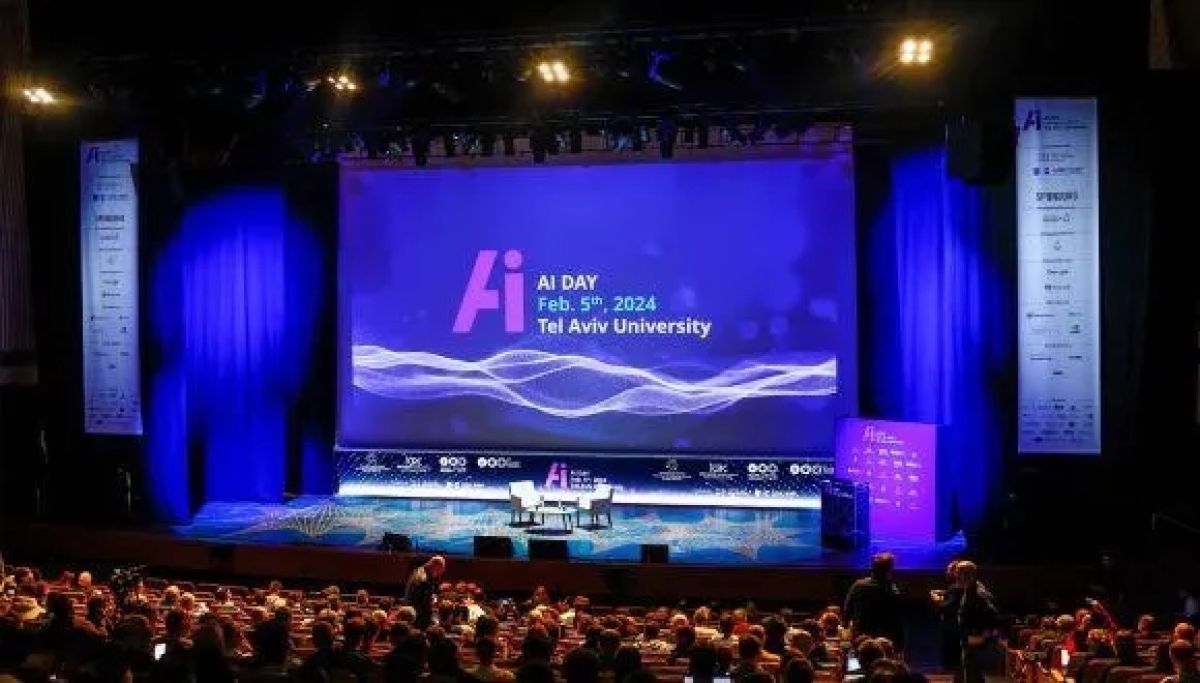

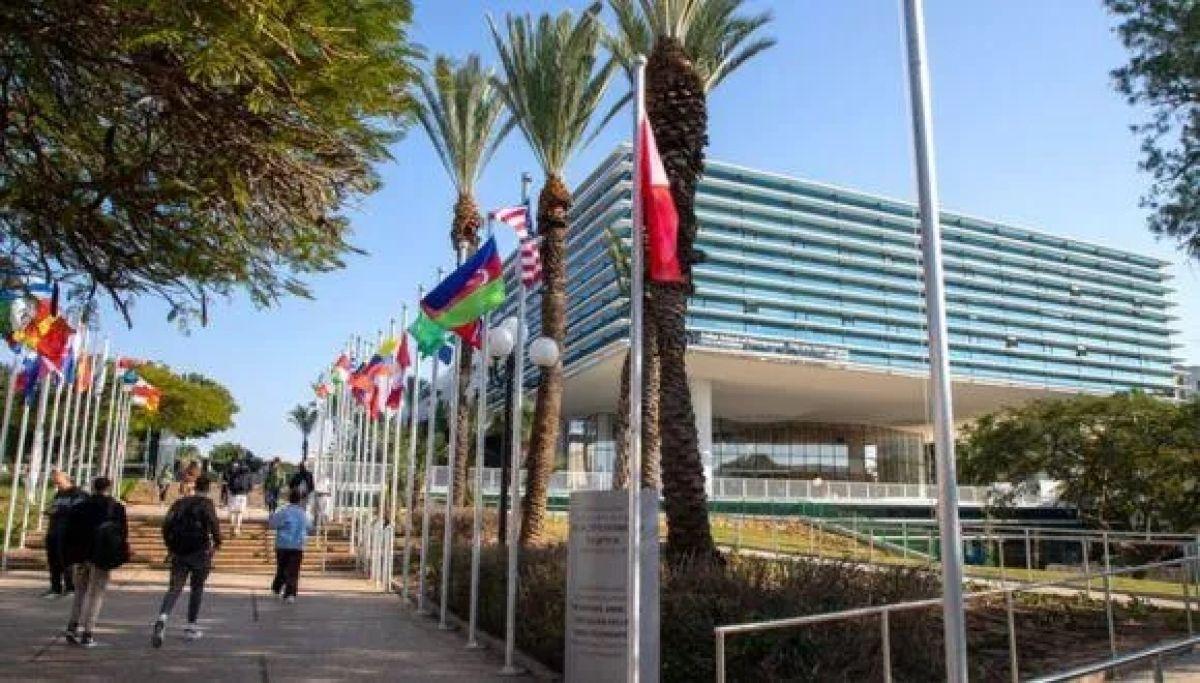
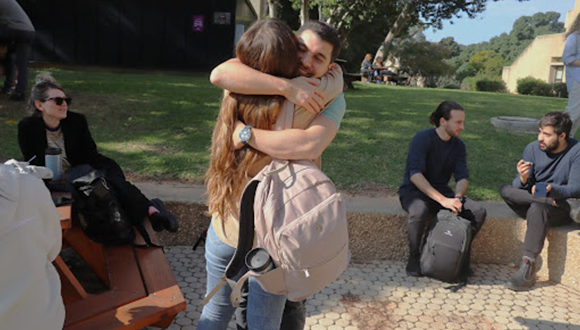 Nevertheless, for those students who have returned, there is something they can all agree on: having classes to go to again, being with their peers again, is something for which they are entirely grateful.
Nevertheless, for those students who have returned, there is something they can all agree on: having classes to go to again, being with their peers again, is something for which they are entirely grateful.
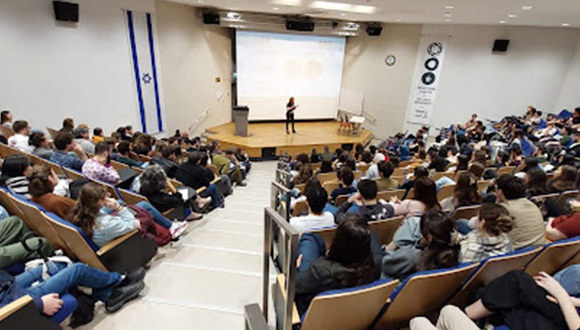 For instance, while classes are currently offered in a hybrid format and can be watched online, Joffe notes that attending in person at TAU is far more popular.
For instance, while classes are currently offered in a hybrid format and can be watched online, Joffe notes that attending in person at TAU is far more popular.
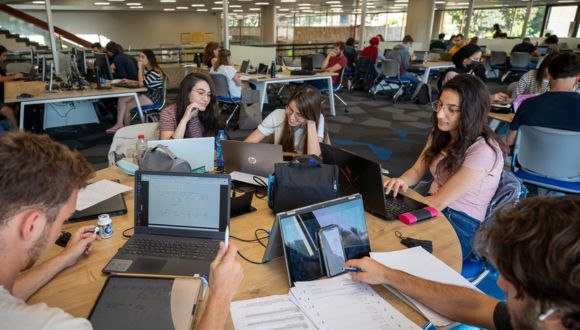 Joffe emphasizes that every Israeli has been impacted significantly by October 7; for her, a girl in her program was murdered and she had two family friends taken hostage (they have since been released).
Yet, despite difficult emotions, Joffe emphasizes that being back in university is the right move for her: “I’m a new immigrant and everyone I know in Israel is from university,” she says. “I don’t know what I would do in Israel without university right now, so I’m very happy it started again.”
Joffe emphasizes that every Israeli has been impacted significantly by October 7; for her, a girl in her program was murdered and she had two family friends taken hostage (they have since been released).
Yet, despite difficult emotions, Joffe emphasizes that being back in university is the right move for her: “I’m a new immigrant and everyone I know in Israel is from university,” she says. “I don’t know what I would do in Israel without university right now, so I’m very happy it started again.”
 She arrived on December 28 and said she’s been enjoying classes since the start of the term and is focused on setting up her life here. “I’m just trying to make some connections with my new friends, new classmates,” she said.
Zengyu also previously completed her
She arrived on December 28 and said she’s been enjoying classes since the start of the term and is focused on setting up her life here. “I’m just trying to make some connections with my new friends, new classmates,” she said.
Zengyu also previously completed her 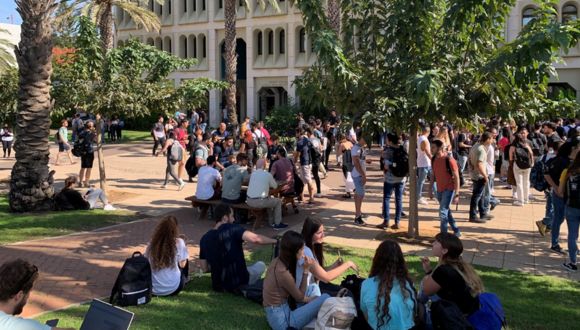 However, he got called up for duty the evening of October 7 and had to report to a base in the south of Israel the next morning.
“I’m stuck in my third year,” says Gazit. While Gazit continues to work full-time in the military, he was recently restationed somewhere in central Israel and at that point, he approached his commander and got special permission to take a German course through TAU.
However, he got called up for duty the evening of October 7 and had to report to a base in the south of Israel the next morning.
“I’m stuck in my third year,” says Gazit. While Gazit continues to work full-time in the military, he was recently restationed somewhere in central Israel and at that point, he approached his commander and got special permission to take a German course through TAU.

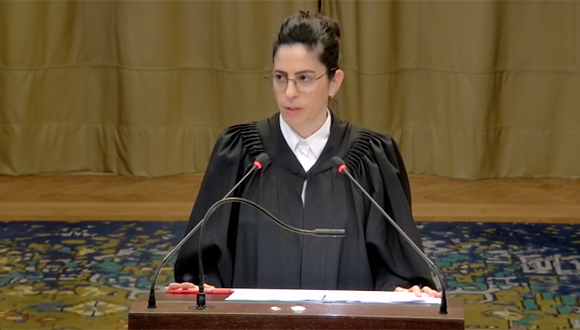 Dr. Galit Raguan, an alumna of Tel Aviv University and a member of Israel’s legal delegation. (Image courtesy of the ICJ. All rights reserved)
While a final resolution on the case is expected to take years, South Africa has requested that, in the interim, the ICJ make
Dr. Galit Raguan, an alumna of Tel Aviv University and a member of Israel’s legal delegation. (Image courtesy of the ICJ. All rights reserved)
While a final resolution on the case is expected to take years, South Africa has requested that, in the interim, the ICJ make 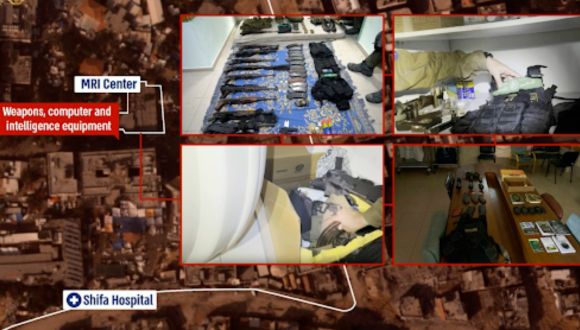 As presented by Israel’s legal team in court, the IDF found Hamas intelligence information and multiple weapons caches at Gaza’s Shifa Hospital, including in the MRI Center. (Image courtesy of the ICJ. All rights reserved)
Raguan also outlined the role of the IDF’s dedicated military unit Coordination of Government Activities in the Territories (COGAT), which oversees border crossings from Israel and works with the United Nations (UN) and other international organizations to facilitate the entry of humanitarian aid into Gaza. Despite an attack on COGAT on October 7, Raguan said the unit has extended its operating hours at both the Kerem Shalom and Rafah crossings to receive more humanitarian goods.
Raguan also said the unit has assisted with establishing four field hospitals and two floating hospitals, getting new ambulances into Gaza and the coordination of air drops. She highlighted how humanitarian assistance continues and that no limitations have been posed, even though “Hamas is regularly stealing aid at the expense of its own population.”
As presented by Israel’s legal team in court, the IDF found Hamas intelligence information and multiple weapons caches at Gaza’s Shifa Hospital, including in the MRI Center. (Image courtesy of the ICJ. All rights reserved)
Raguan also outlined the role of the IDF’s dedicated military unit Coordination of Government Activities in the Territories (COGAT), which oversees border crossings from Israel and works with the United Nations (UN) and other international organizations to facilitate the entry of humanitarian aid into Gaza. Despite an attack on COGAT on October 7, Raguan said the unit has extended its operating hours at both the Kerem Shalom and Rafah crossings to receive more humanitarian goods.
Raguan also said the unit has assisted with establishing four field hospitals and two floating hospitals, getting new ambulances into Gaza and the coordination of air drops. She highlighted how humanitarian assistance continues and that no limitations have been posed, even though “Hamas is regularly stealing aid at the expense of its own population.”
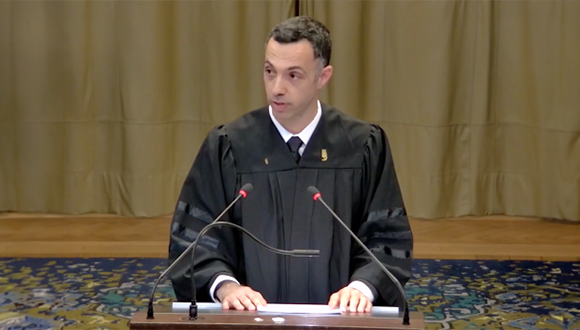 Dr. Omri Sender, an alumnus of Tel Aviv University and a member of Israel’s legal delegation. (Image courtesy of the ICJ. All rights reserved)
Sender noted that, before the war, approximately 70 trucks carrying food entered Gaza every day, whereas in the first two weeks of January 109 trucks entered each day. He also highlighted that the amount of cooking gas entering Gaza had doubled to 90 tons per day since December 21; moreover, since December 8, the amount of fuel entering Gaza had also doubled and now meets the target requested by the UN: 180,000 liters per day.
Sender also pointed to the fact that the hostilities in Gaza are winding down, and he stated that Israel has already started to transition to a phase with fewer ground troops and less intense fighting.
Furthermore, as argued by team lead Prof. Malcolm Shaw KC, South Africa also failed to effectively illustrate Israel’s intent to commit genocide. Given the case is at the provisional measures phase, genocidal acts do not have to be proven; demonstrating plausible intent would be enough for the court to intervene. However, as Shaw contended, to do this one must directly link any potential utterance or statement to on-the-ground policy. In this, South Africa failed, Shaw argued.
Dr. Omri Sender, an alumnus of Tel Aviv University and a member of Israel’s legal delegation. (Image courtesy of the ICJ. All rights reserved)
Sender noted that, before the war, approximately 70 trucks carrying food entered Gaza every day, whereas in the first two weeks of January 109 trucks entered each day. He also highlighted that the amount of cooking gas entering Gaza had doubled to 90 tons per day since December 21; moreover, since December 8, the amount of fuel entering Gaza had also doubled and now meets the target requested by the UN: 180,000 liters per day.
Sender also pointed to the fact that the hostilities in Gaza are winding down, and he stated that Israel has already started to transition to a phase with fewer ground troops and less intense fighting.
Furthermore, as argued by team lead Prof. Malcolm Shaw KC, South Africa also failed to effectively illustrate Israel’s intent to commit genocide. Given the case is at the provisional measures phase, genocidal acts do not have to be proven; demonstrating plausible intent would be enough for the court to intervene. However, as Shaw contended, to do this one must directly link any potential utterance or statement to on-the-ground policy. In this, South Africa failed, Shaw argued.
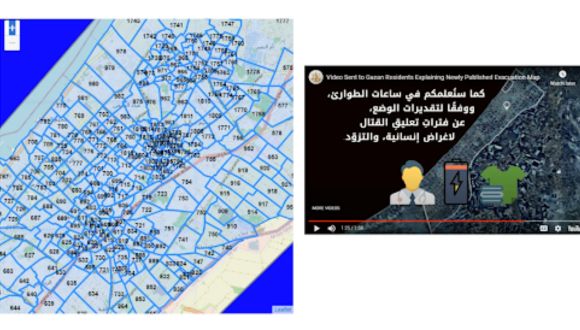 A map of evacuation zones created by the IDF to assist with civilian safety was shared in court, along with a screenshot of an instructional video in Arab of how to use the map (Image courtesy of the ICJ. All rights reserved)
To further support this claim, Shaw also provided evidence of daily IDF operational directives that, in accordance with international law and contradicting South Africa’s case, prioritize mitigating harm to and punishment of civilians.
A map of evacuation zones created by the IDF to assist with civilian safety was shared in court, along with a screenshot of an instructional video in Arab of how to use the map (Image courtesy of the ICJ. All rights reserved)
To further support this claim, Shaw also provided evidence of daily IDF operational directives that, in accordance with international law and contradicting South Africa’s case, prioritize mitigating harm to and punishment of civilians.
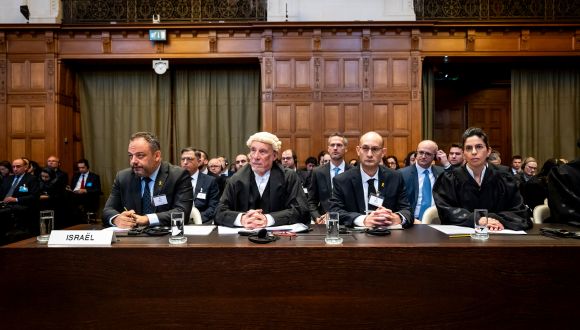 Members of Israel’s legal delegation at the International Court of Justice. (credit: UN Photo/ICJ-CIJ/Frank van Beek. Courtesy of the ICJ. All rights reserved)
Moreover, the general omission of Hamas from South Africa’s case was something, the Israel team argued, that demonstrated a high level of prejudice:
Members of Israel’s legal delegation at the International Court of Justice. (credit: UN Photo/ICJ-CIJ/Frank van Beek. Courtesy of the ICJ. All rights reserved)
Moreover, the general omission of Hamas from South Africa’s case was something, the Israel team argued, that demonstrated a high level of prejudice:

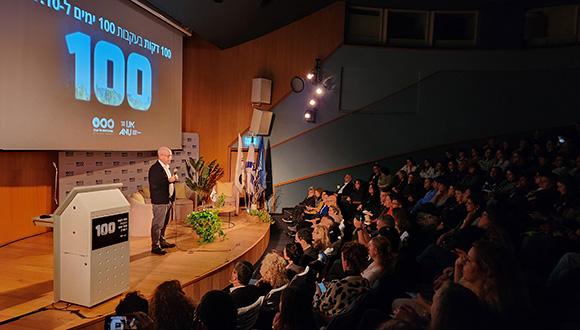
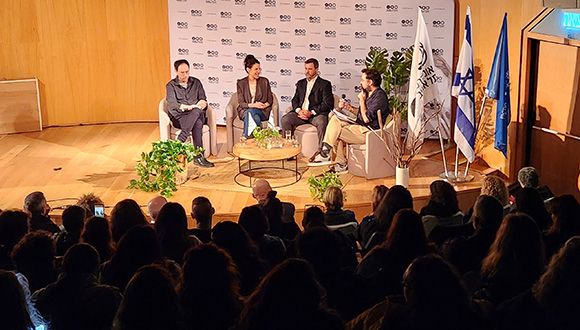
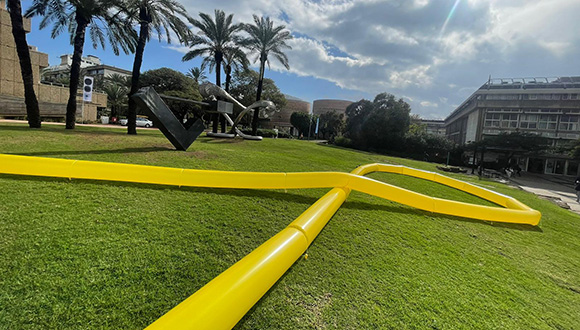

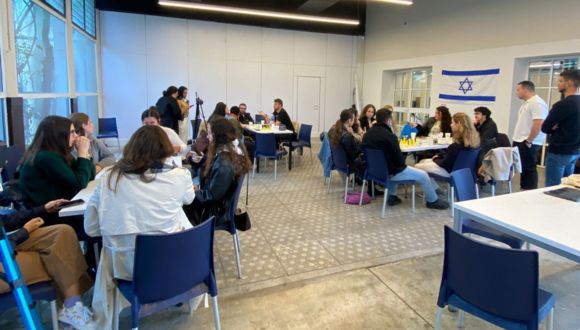
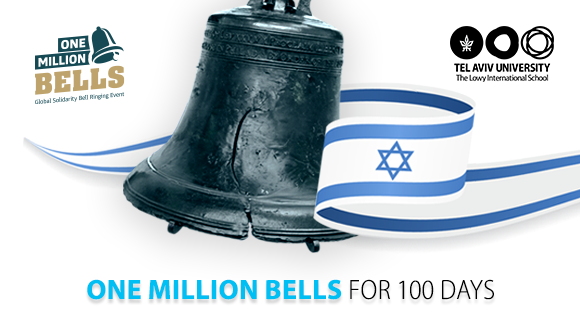 As Dr. Inon Schenker, Initiative Creator, explains: “Bells have been a powerful tool for centuries. One bell can warn of danger and save a village; One million bells may shake the world, herald hope and mark a line between humanity and evil. October 7th, 2024 must be remembered globally as a defining moment against terror.”
As Dr. Inon Schenker, Initiative Creator, explains: “Bells have been a powerful tool for centuries. One bell can warn of danger and save a village; One million bells may shake the world, herald hope and mark a line between humanity and evil. October 7th, 2024 must be remembered globally as a defining moment against terror.”
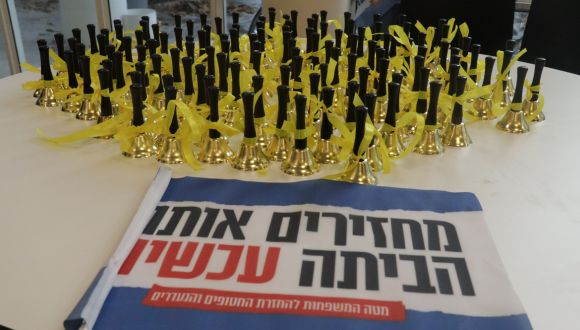 TAU Rector Prof. Mark Shtaif extended his heartfelt condolences to the families of all the war casualties and expressed sincere hope for the swift release of the hostages and a resolution to the conflict.
Tal, a representative from the Hostage Forum, underscored the urgency of advocating for the prompt liberation of hostages. American actress and performer Jade Taylor sang at the event, accompanied by Ido Montaniez.
TAU Rector Prof. Mark Shtaif extended his heartfelt condolences to the families of all the war casualties and expressed sincere hope for the swift release of the hostages and a resolution to the conflict.
Tal, a representative from the Hostage Forum, underscored the urgency of advocating for the prompt liberation of hostages. American actress and performer Jade Taylor sang at the event, accompanied by Ido Montaniez.
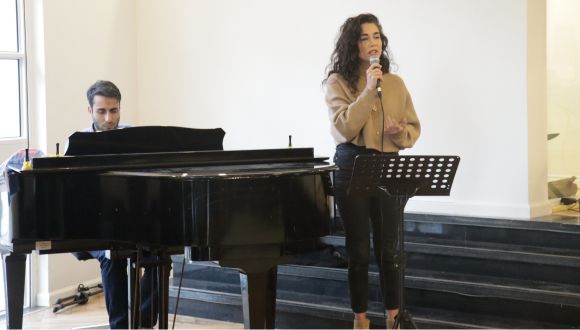 Ido Montaniez and Jade Taylor at the Lowy International School
Partners of the One Million Bells initiative included the Israeli Ministry of Foreign Affairs, World Zionist Organization, Center for Jewish Impact, major hotel chains, the Stock Exchange, United Nations for Israel, Impact for Healthy Future, NOVA, and global faith organizations.
Ido Montaniez and Jade Taylor at the Lowy International School
Partners of the One Million Bells initiative included the Israeli Ministry of Foreign Affairs, World Zionist Organization, Center for Jewish Impact, major hotel chains, the Stock Exchange, United Nations for Israel, Impact for Healthy Future, NOVA, and global faith organizations.

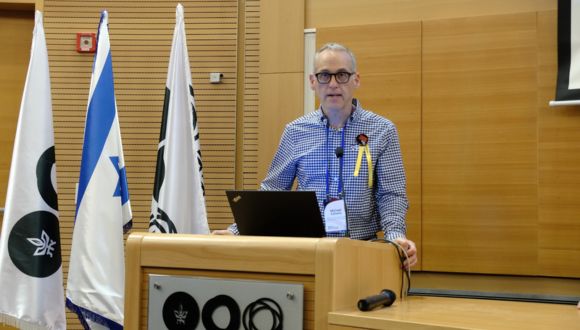 Michael Kahana, Edmund J. and Louise W. Kahn Term Professor of Psychology at the University of Pennsylvania
TAU President Ariel Porat thanked the UPenn delegation for their visit: “It’s important for us to have people like you come to us during these most difficult times ever because these days we need friends.
Michael Kahana, Edmund J. and Louise W. Kahn Term Professor of Psychology at the University of Pennsylvania
TAU President Ariel Porat thanked the UPenn delegation for their visit: “It’s important for us to have people like you come to us during these most difficult times ever because these days we need friends.
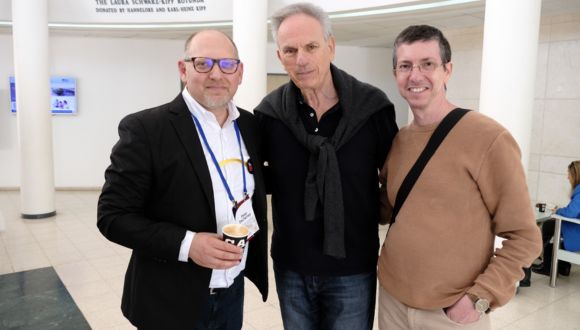 Professor Peter Decherney (UPenn), film director Avi Nesher, film scholar Dr Shmulik Duvdevani
Professor Peter Decherney (UPenn), film director Avi Nesher, film scholar Dr Shmulik Duvdevani
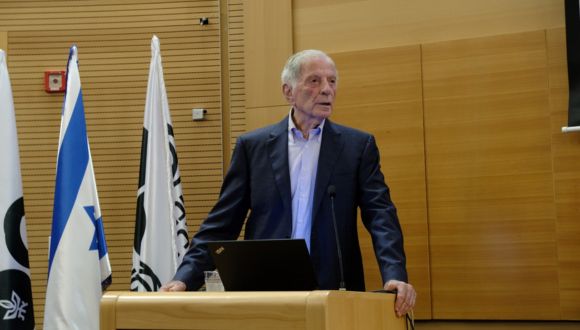 Prof Itamar Ravinovitch, former TAU President, ambassador to the US (1993-1996), and Visiting Professor at UPenn, Harvard, and Stanford
The internal divide in the country, exacerbated by attempts to weaken democracy, created an opportunity for adversaries. The policy to cultivate Hamas at the expense of the Palestinian Authority backfired, leading to a significant transfer of Qatari money into the hands of Hamas. Intelligence failures compounded the situation, resulting in a delayed response from the Israeli Defense Forces (IDF).
Prof Rabinovitch stressed that the current conflict is not merely a war with Gaza but represents the first war between Israel and Iran, with an uncertain resolution and future plans for Gaza.
Prof Itamar Ravinovitch, former TAU President, ambassador to the US (1993-1996), and Visiting Professor at UPenn, Harvard, and Stanford
The internal divide in the country, exacerbated by attempts to weaken democracy, created an opportunity for adversaries. The policy to cultivate Hamas at the expense of the Palestinian Authority backfired, leading to a significant transfer of Qatari money into the hands of Hamas. Intelligence failures compounded the situation, resulting in a delayed response from the Israeli Defense Forces (IDF).
Prof Rabinovitch stressed that the current conflict is not merely a war with Gaza but represents the first war between Israel and Iran, with an uncertain resolution and future plans for Gaza.
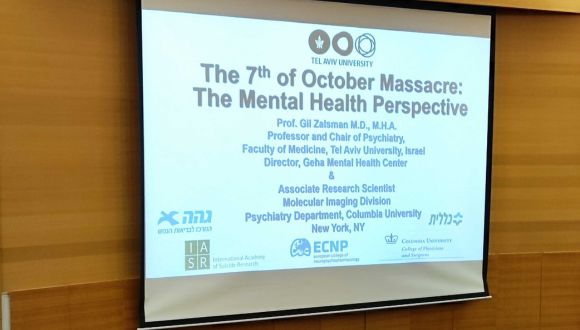 To counteract these effects, Israeli mental health professionals initiated various initiatives. Immediate victims were treated, and initiatives like the Regional Trauma Center, Daycare Unit for Sexual Victims, and Center for Children and Adolescents were established.
Additionally, Prof Yair Bar-Haim detailed the creation of the
To counteract these effects, Israeli mental health professionals initiated various initiatives. Immediate victims were treated, and initiatives like the Regional Trauma Center, Daycare Unit for Sexual Victims, and Center for Children and Adolescents were established.
Additionally, Prof Yair Bar-Haim detailed the creation of the 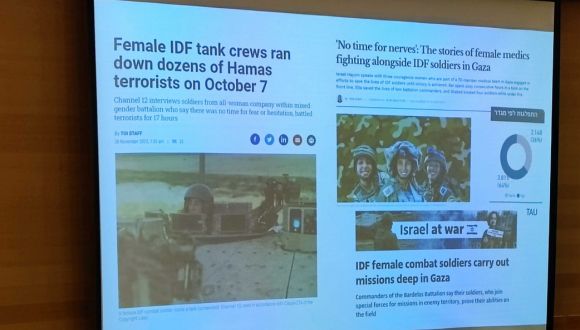 At the same time, many Israeli women and girls became victims of sexual violence on October 7. The shock over mass casualties initially prioritized victim identification and burial over forensic evidence collection, complicating international acknowledgment of the violence. To compound the issue, irresponsible domestic discourse about the scope of sexual violence has caused significant moral panic in Israel.
Another serious gender issue is the struggle to secure the release of hostages held by Hamas. The Red Cross has not been allowed to visit hostages, making it impossible to establish their health condition and to properly prioritize those who need to be released first.
At the same time, many Israeli women and girls became victims of sexual violence on October 7. The shock over mass casualties initially prioritized victim identification and burial over forensic evidence collection, complicating international acknowledgment of the violence. To compound the issue, irresponsible domestic discourse about the scope of sexual violence has caused significant moral panic in Israel.
Another serious gender issue is the struggle to secure the release of hostages held by Hamas. The Red Cross has not been allowed to visit hostages, making it impossible to establish their health condition and to properly prioritize those who need to be released first.
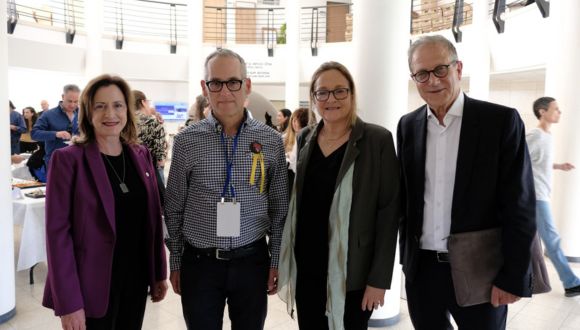 Prof Karen Avraham, Dean of the TAU Faculty of Medicine; Prof Michael Kahana, Edmund J. and Louise W. Kahn Term Professor of Psychology at the University of Pennsylvania; Prof Milette Shamir, TAU VP International; Prof Itzhak Fried, Professor-in-Residence, Neurosurgery, University of California Los Angeles
Prof Karen Avraham, Dean of the TAU Faculty of Medicine; Prof Michael Kahana, Edmund J. and Louise W. Kahn Term Professor of Psychology at the University of Pennsylvania; Prof Milette Shamir, TAU VP International; Prof Itzhak Fried, Professor-in-Residence, Neurosurgery, University of California Los Angeles

